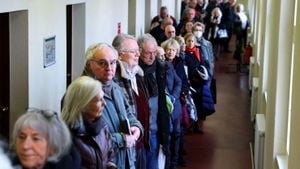The 2025 German Federal Elections marked a pivotal moment for the country, with the Conservative Party, led by Friedrich Merz, achieving a noteworthy victory. Initial projections indicated the CDU/CSU coalition secured approximately 29% of the votes, according to the public broadcast networks ARD and ZDF. More significantly, the far-right Alternative for Germany (AfD) party made history by capturing between 19.5% and 20% of the votes, reflecting double the support it received during the 2021 elections.
This election held on February 23, 2025, was not merely about party preferences; it was emblematic of shifting political landscapes across Germany. Merz, eyeing the chancellorship, remarked, "We must quickly become operational to do what is needed domestically and to re-establish our presence in Europe." His urgency stemmed from pressing international and domestic challenges, which he noted cannot afford delays due to protracted coalition negotiations.
The AfD, under the leadership of Alice Weidel, rejoiced at their historic results, with Weidel exclaiming, "We have never been stronger nationally." This surge was bolstered by increased support from areas within former West Germany and was significantly fueled by campaign themes emphasizing immigration and national security. The party's rise is seen as reflective of broader societal anxieties following recent violent incidents, including notable attacks perpetrated by foreign nationals, which have stirred public sentiments and emboldened the right.
Meanwhile, outgoing Chancellor Olaf Scholz faced the consequences of the Social Democratic Party's (SPD) dismal performance, capturing only about 16% of the vote—its worst result since World War II. Scholz acknowledged the election result, stating, "The election result is bad, and I take responsibility for it," as he addressed upset party members. This setback was not unexpected, but the extent of the SPD's decline was startling.
The Green Party, which shared power with the SPD, also saw diminished support, ranging between 12% and 13.5%. Similarly, the Free Democratic Party (FDP) struggled, flirting with the 5% threshold needed to gain representation, indicating possible exclusion from the next Bundestag entirely.
Adding complexity to the electoral aftermath, the results prompted discussions about coalition possibilities. Traditionally, German political dynamics have favored coalition approaches, and with the CDU/CSU's sweeping victory, Merz will likely seek negotiations with the SPD, breathing new life to the concept of the "Grand Coalition"—a partnership between the two major parties historically. Although he has ruled out any formal coalition with the AfD, the current political mood may require maneuvering to form a stable government.
The significance of this election extends beyond the immediate outcomes; it resonates with rising populist sentiments throughout Europe. Scholz's government, previously perceived as stable, succumbed to disarray partly fueled by perceptions of ineffective leadership, particularly as he presided over increasingly fractious coalition dynamics. The collapse of the governing infrastructure was stark, occurring just months before the third anniversary of the Russian invasion of Ukraine, which has drawn heightened scrutiny toward Germany's international role.
The 2025 elections also highlighted stark voter mobilization. Voter turnout reached around 84%, up from 76.4% in 2021, illustrating intensified engagement among the electorate, particularly among first-time voters, numbering over 2 million. Such trends signal shifting paradigms and increasing stakes for the populace eager for governmental change.
Friedrich Merz's assertion about needing swift action resonates widely as policymakers eye the horizon for Europe's increasingly turbulent political climate. The fast-paced evolution of alliances and ideological divisions points to potential upheavals, signaling the need for astute governance capable of bridging varied constituent realities.
Germany's path forward appears layered with complicity and negotiation, demanding adept political maneuvering from Merz and his potential allies. Finding common ground for coalition-building may prove challenging as the SPD absorbs the fallout from its electoral defeat, which may stand as both caution and opportunity for the major political actors.
Overall, the results of the 2025 German Federal Elections position the CDU/CSU as the leading force but simultaneously bring to the fore the rising influence of the AfD, compelling both established and emergent parties to contend with realities of changing voter priorities and political expectations. The German political arena faces momentous tasks to maintain coherence amid discordant voices and aspirations, all watching how this reshaped political environment will respond to pressing national and international challenges.



